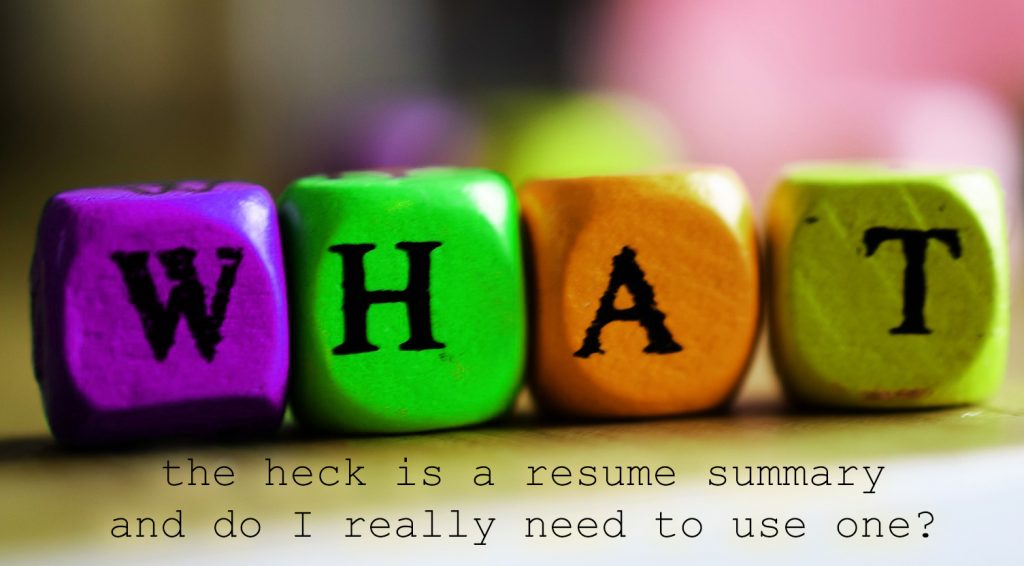by Chrissy Roshak
May 22, 2020
Spring is here, and resume summaries are back in style. Before you throw up your hands in despair, hear us out on this one. Resume summaries are a great tool for your coronavirus era job search. But if you dumped your resume summary the last time you edited it or never put one on your resume in the first place, we’re here to help. Read on for answers to your top questions about resume summaries and learn how to use one to help land your next interview.
Q: What Is a Resume Summary?
A: A resume summary is a short paragraph at the top of your resume. Think of it like a movie trailer. It’s a place where you can highlight the main points you want hiring managers to focus on. But keep it short. Keep it interesting. And see if you can entice the hiring manager to want to hear more. They aren’t going to read a lengthy paragraph, so save the details for your interview. Instead they’ll skim your resume, so it’s best to keep it simple and straightforward.

Q: So what changed? Why are they making a comeback?
A: The coronavirus pandemic has changed everything about the job market. Industries that were booming several months ago have suddenly shut down, whole companies are suddenly working from home, and other industries that provide essential services are scrambling to keep up. With such a massive shift in the job market, hiring managers are left sorting through piles of resumes trying to figure out which candidate will be the best fit for the job. One of the unique challenges facing job seekers is trying to get hiring managers to understand why they really are qualified for a job they have no previous work experience in. And that’s what makes the resume summary so powerful right now. It’s the perfect way to literally put that explanation at the top of your resume.
Q: Do I really need to use one?

A: Last most of us heard resume summaries were old school and they should be removed for simplicity. But they’ve made a comeback, and are great tool if you’re switching careers amidst the coronavirus pandemic. Maybe you’re switching careers because your industry shutdown but you still need a paycheck. Maybe you’re on furlough seeking temporary work until your regular employer brings you back. Or maybe you your last job just wasn’t a good fit and you’re looking for a better fit in a different industry.
It’s hard for recruiters and hiring managers to figure out why you’re applying for a janitorial position in a warehouse if your most recent experience was substitute teaching. If you put that information at the top of your resume, the recruiter might be more likely to send it to a hiring manager’s inbox instead of the recycling bin.

Q: What should I include in a resume summary?
A: If you’re switching jobs or moving to a new industry, the resume summary is the place to provide some information explaining your transition. But don’t forget your audience. Hiring managers don’t want a rundown of the bills you’re behind on because your last employer closed shop.
While they would like to understand that you’re switching industries because your last position isn’t in demand right now, recruiters also want to know what skills you have that will translate into the position you’re applying for. If you were an event planner with strong organization and motivational skills, highlight those skills in your application for manager at an essential business.

Q: How do I Write a Resume Summary?
A: Start with a brief explanation of why you’re switching industries. Even if the position title is the same, but the type of business you’re targeting is different, address it in your summary. For example, “I have 7 years of customer service experience at a local gym. Since gyms are closed now, I’m seeking a customer service position in the grocery industry.” Keep this explanation short and to the point and don’t dwell on it.
Next you should move into what skills you bring to the table and more importantly, how those skills relate to the position you’re applying for. Start with the job ad that prompted you to apply for the position in the first place. Make a list of the skills they want and highlight the ones you have. This is the list you want to draw attention to throughout your resume. But in the resume summary you have the opportunity to describe how your non-work related experience qualifies you for the job. Did you do volunteer work organizing files for a nonprofit organization? Did you order all of the supplies and organize vendors for your cousin’s wedding?
Take your resume summary to the next level by describing the results you’ve achieved. This is the place to brag about what makes you an awesome candidate. For example, “I saved our Homeowners Association hundreds of dollars by switching suppliers to source from a local company which resulted in lowering HOA dues for the 65 homeowners in our neighborhood.”

Q: Now that I’ve written one, how do I know if It’s any good?

A: Read it from the point of view of a hiring manager. Does your resume summary give a compelling reason to hire you? Does it explain what you can do for the company? It should be straightforward without too much detail. Give the hiring manager enough information to want to bring you in for an interview but leave the interesting details for the interview.
E-mail it to a trusted friend to have them read through it. Let them know that your goals are to keep it short, explain your job search situation, and highlight your skills. Ask them for honest feedback, and accept any criticism with grace. If you don’t agree with their feedback, get a second opinion before you edit it.
Still need help with it? Have your recruiter read through and help you edit it. They might have inside information on what the hiring manager is looking for and can help you highlight those skills.
Check out our other blog posts for more useful tips and tricks!

